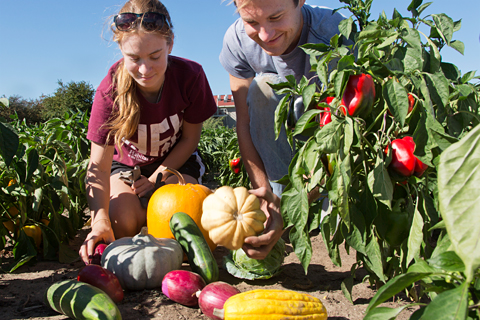It’s late May in the freshly tilled soil of a three-plus-acre organic farm on the U of M St. Paul campus. Horticulture student Lindsay Mayer kneels, wearing purple gloves and an orange bandanna to keep the sweat out of her eyes as she plants shallot after shallot.
She’s one of seven College of Food, Agricultural and Natural Resource Sciences (CFANS) student interns hired by farm manager Courtney Tchida to operate Cornercopia. Each spring, and until the ground freezes, a new crop of students step onto the grounds of this outdoor classroom, ready to soak up the lessons of the land, the weather, the insects, the plants—even the chickens.
The internship illustrates exactly what CFANS faculty and leaders had in mind when establishing the new requirement for students to complete one high-impact experiential activity prior to graduation.
“This internship can be really crucial in a number of different ways,” says Tchida. “There are some interns who want to be farmers, and this gives them that taste of ‘is this really something I want to pursue? Or, is it something fun to do for one summer?’”
Cornercopia gives them insight into an entire food system. The interns plant and tend the crops. They harvest and process them. They sell the produce at farmers markets, earning money to put back into the farm.
And while students come to Cornercopia with varying levels of farming experience, they have one thing in common: They want to be more connected with their food, says Tchida.
Mayer, who is focused on organic and sustainable agriculture, started gardening just a few years ago. She took an organic farm planning, marketing, and growing course before her internship to gain more experience.
“These are skills I want to learn for myself and then teach to others,” says Mayer, who plans to pursue urban agriculture.
She knows this internship amounts to more than a job—it’s become a vocation, and perhaps her life’s work.
“In farming, you have a direct connection with nature and life processes,” says Mayer, wiping dirt from her brow. “If you do one thing every day … you can see the progress of your work.” She finds it more tangible than an office job.
Knowledge growth
Mid-June: Horticulture major Ben Boo is weeding potato and bean fields.
“This is a cool experience to work on a farm and have a hands-on role,” says Boo, who is one of the farm’s marketing managers, along with Ryan Murphy, a master’s student in horticulture.
There’s no time for marketing today. It’s one of the few dry days of the season, and everyone is focused on weeding and additional planting.
It’s physical, demanding work. With each task, the students develop a deeper appreciation for what it takes to farm.
“It really gives them a value for food and the food system and where food comes from,” Tchida says. “Suddenly that carrot, that beet, and that tomato have intrinsic value. They see how much work goes into getting it from seed to plate.”
That’s not something learned in a traditional classroom. Neither is how unpredictable weather might affect yields.
Mother Nature delivered one of the first lessons of the year—patience—to Cornercopia interns with an unusually late, cold, and wet spring. Students didn’t begin planting until mid-May, nearly a month behind schedule—yet just 14 days after the last snowflakes of the season.
But while snow buried the fields, volunteers seeded soil blocks inside, giving plants a head start.
After a day of planting, Murphy emerges from the field brushing soil off his blue jeans and pauses as he peers back at his work. Green leaves and stems barely break the surface.
Later in June, another lesson. Mother Nature whips up thunderstorms with high winds, upending chicken coops and scattering chickens into the night. Using flashlights, Tchida and others comb the fields. They gather wayward chickens and return them to the coops, two of which are damaged. Most of the crops escape harm.
July is a good month. A combination of moisture and warm weather has transformed Cornercopia into a sea of lush vegetation.
Some interns harvest while others process the bounty. They all have a chance to walk in a farmer’s boots.
Nearby, Ryland Sorenson plants beets. This is his second internship, and he’s learned enough that he teaches horticulture to St. Paul high school students.
“A lot of them have never been on a farm before,” Sorenson says. “A lot of them … they don’t want to get dirty.”
Today, he gives the kids a choice of weeding or planting. They choose planting.
“I hope to teach them that growing your own food is important, and to show them that it’s not impossible to have fresh organic food throughout the summer in Minnesota,” he says.
And who knows. Their experience here may just lead them to be tomorrow’s farmers.
This story was adapted from the original appearing in the fall issue of Solutions magazine, a publication of the College of Food, Agricultural and Natural Resource Sciences.
*Source: University of Minnesota

